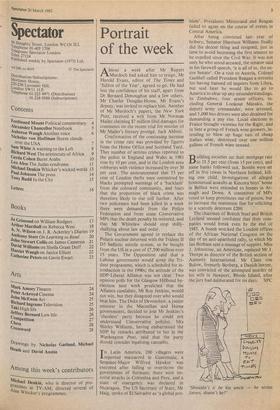Portrait of the week
Almost a week after Mr Rupert Murdoch had asked him to resign, Mr Harold Evans, editor of The Times and `Editor of the Year', agreed to go. He had lost the confidence of his staff, apart from Dr Bernard Donoughue and a few others. Mr Charles Douglas-Home, Mr Evans's deputy, was invited to replace him. Another of ' Mr Murdoch's papers, the New York Post, received a writ from Mr Norman Mailer claiming $7 million libel damages for comments on the recent trial for murder of Mr Mailer's literary protege, Jack Abbott.
Confirmation of the continuing increase in the crime rate was provided by figures from the Home Office and Scotland Yard. Ther number of serious crimes reported to the police in England and Wales in 1981 rose by 10 per cent, and in the London area robberies with violence increased by over 30 per cent. The announcement that 55 per cent of London thefts were committed by blacks prompted warnings of a 'backlash' from the coloured community, and fears that the proportion of black crime was therefore likely to rise still further. After two policemen had been killed in a week there were demands. from the Police Federation and from some Conservative MPs that the death penalty be restored, and that Mr Whitelaw should stop shilly- shallying about law and order.
The Government agreed to replace the Polaris nuclear deterrent with the Trident II D5 ballistic missile system, to be bought from the US at a cost of £7,500 million over 15 years. The Opposition said that a Labour government would scrap the Tri- dent programme, which is scheduled for in- troduction in the 1990s; the attitude of the SDP-Liberal Alliance was not clear. Two opinion polls for the Glasgow Hillhead by- election next week predicted that the Alliance candidate, Mr Roy Jenkins, would not win, but they disagreed over who would beat him. The Duke of Devonshire, a junior minister in the Macmillan and Home governments, decided to join Mr Jenkins's 'classless' party because he could not understand Conservative policies. Mrs Shirley Williams, having embarrassed the SDP by remarks attributed to her in the Washington Post, said that the party should consider legalising cannabis.
In Latin America, 200 villagers were
reported massacred in Guatemala; a Sergeant-Major Wilfred Hawker was executed after failing to overthrow the government of Surinam; there were ter- rorist attacks in Colombia and Peru, and a state of emergency was declared in Nicaragua. The US Secretary of State, Mr Haig, spoke of El Salvador as 'a global pro-
blem'. Presidents Mitterrand and Reagan failed to agree on the course of events in Central America.
After being convicted last year of bribery, Senator Harrison Williams finally did the decent thing and resigned, just in time to avoid becoming the first senator to be expelled since the Civil War. It was not only he who stood accused, the senator said in his farewell speech, 'it is all of us, the en- tire Senate'. On a visit to Austria, Colonel Gaddafi called President Reagan a terrorist for having banned oil imports from Libya, but said later he would like to go to America to clear up any misunderstandings. In Zimbabwe, four senior officers, in- cluding General Lookout Masuku, the deputy army commander, were arrested, and 1,000 bus drivers were also detained for demanding a pay rise. Local elections in France brought victories for the Right, and in Sete a group of French wine growers, in- tending to blow up huge vats of cheap Italian wine, destroyed over one million gallons of French wine instead.
141 uilding societies cut their mortgage rate I./to 13.5 per cent (from 15 per cent), and some banks followed suit. Bombs were set off in five towns in Northern Ireland, kill- ing one child. Investigations of alleged homosexual assaults at Kincora boys' home in Belfast were extended to homes in Ar- magh and Down. A committee of MPs voted to keep prostitutes out of prison, but to increase the maximum fine for soliciting to a scarcely deterrent £200.
The chairmen of British Steel and British Leyland seemed confident that their com- panies would break even by the end of 1983. A bomb wrecked the London offices of the African National Congress on the day of an anti-apartheid rally, to which Mr Ian Botham sent a message of support. Miss J. Johnstone, an American, replaced Mr J. Thorpe as director of the British section of Amnesty International. Mr Claus von Bulow, formerly Borberg, a Danish lawyer, was convicted of the attempted murder of his wife in Newport, Rhode Island, after the jury had deliberated for six days. SPC
'Shouldn't it be his uncle — he writes farces, doesn't he?'


































 Previous page
Previous page